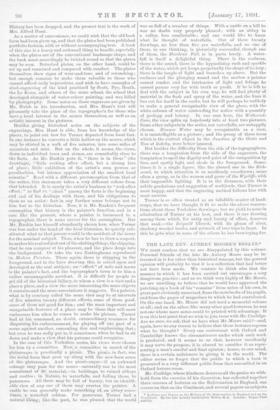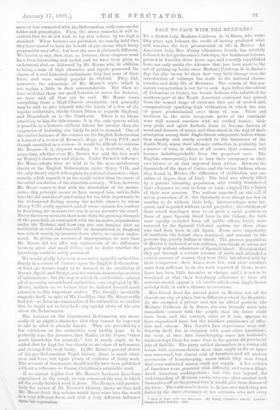THE LATE REV. AUBREY MOORE'S ESSAYS.* WE must confess that
we are disappointed by this volume. Personal friends of the late Mr. Aubrey Moore may be in- terested in it for other than historical reasons, but the general opinion will probably be that it is a collection that had better not have been made. We venture to think also that the manner in which it has been carried out encourages a very dangerous practice ; and as we think very highly of Mr. Moore, we are unwilling to believe that ho would have approved the patching-up a book of his " remains " from notes of his own, in great part obviously unrevised, from the notebooks of his pupils, and from the pages of magazines to which he had contributed. On the one hand, Mr. Moore did not need a memorial volume at all ; and on the other, like many other good lecturers, he was not one whose mere notes could be printed with advantage. It is on this last point that we wish to join issue with Mr. Coolidge. Are we sure, we ask, that we have what Mr. Moore said P—and, again, have we any reason to believe that these lectures express what he thought? Every one conversant with Oxford and Cambridge knows the circumstances under which such work is produced, and it seems to us that, however excellently it may serve its purpose, it is absurd to consider it as repre- senting a man's careful and final opinion ; hence, to our mind, there is a certain unfairness in giving it to the world. The editor seems to forget that the public to which a book is presented is a very different public from that assembled in an Oxford lecture-room.
Mr. Coolidge, whose kindness deserves all the praise we with- hold from the exercise of his discretion, has collected together three courses of lectures on the Reformation in England, one course on that on the Continent, and several papers on subjects
• Led utes and Paroro on the History of the Reformation in England and on the Continent. By the into Aubrey Lackington Moore, M.A. London : Kogan Paul and Co. more or less connected with the Reformation, with some useful tables and genealogies. From the above remarks, it will be evident that we do not wish to try this volume by too high a standard. When lectures are published, we usually hold that they have ceased to have the benefit of any excuse -which hasty preparation may offer ; but here the case is obviously different. We hasten to say, then, that as lectures, these chapters must have been interesting and useful, and we have been given to understand that, as delivered by Mr. Moore, who, in addition to being a man of high character and repute, possessed the charm of a real historidal enthusiasm, they lost none of their force, and were widely popular in Oxford. They had, moreover, the advantage of Mr. Moore's style, which is not saying a little in their commendation. But when we have said that these are good lectures, or notes for lectures, we have said all that can be said. Mr. Moore views everything from a High-Church standpoint, and generally may be said to give himself into the hands of a few of the regular authorities, chiefly Canon Dixon as regards England, and Hagenbach as to the Continent. There is no blame attaching to him for this course; it is the only system which is possible to a lecturer without labour far greater than the exigencies of lecturing can fairly be said to demand. One of the earlier lectures of the courses on the English Reformation is formed of a review of Brewer's Reign of Henry VIII, and though uncritical as a review—it would be difficult to criticise Mr. Brewer—it is eloquent reading. It is doubtful, at the same time, whether even Mr. Brewer has said the last word on Wolsey's character and objects. Under Brewer's influence, Mr. Moore adopts what we hold to be the most satisfactory theory of the English Reformation under Henry VIII., and the only theory which will explain its political character,—that, namely, which regards it as the result rather than the cause of the social revolution of the sixteenth century. When, however, Mr. Moore comes to deal with the dissolution of the monas- teries, this principle seems to have escaped him, and he falls into the old mistake of attributing far too little importance to the widespread feeling among the middle classes to whom Henry VIII. really appealed, and of whose opinion his conduct in dissolving the monasteries was in great measttre the result. Every discovery seems to show more fully the growing strength of the parochial, as contrasted with the monastic, organisation under the Tudors ; and hose any one can imagine that an institution so vast and venerable as monasticism in England was ruined merely by pressure from above, we cannot under- stand. In giving an account of impropriation, we note that Mr. Moore did not offer any explanation of the difference between great and small tithes ; and we doubt whether the knowledge could be safely presumed.
We would gladly have seen more notes upon the authorities. Surely in a course of lectures upon the English Reformation, at least one lecture ought to be devoted to the credibility of Burnet, Speed, and Strype, and the various manuscript sources of information ; but the way in which the authorities—almost all of necessity second-hand authorities—are employed by Mr. Moore, inclines us to believe that he bad not devoted much attention to this important matter. The thought inevitably suggests itself, in spite of Mr. Coolidge, that Mr. Moore really had not—as, from an examination of his authorities, we confess that he ought not to have had—any special views of his own about the Reformation.
The lectures on the Continental Reformation are neces- sarily of so slight a character that they cannot be expected to add to what 'is already known. They are preceded by a few criticisms on the authorities very hastily done. It is perfectly true, for instance, that Ranke, in his Popes, "takes much knowledge for granted ; " but it surely ought to be added that be kept far too closely to one class of references, and arranged his work badly. In Mr. Moore's general sketch of the pre-Reformation Papal history, there is much clear- ness and force, but again plenty of evidence of hasty work. The account of Savonarola should hardly have been published without a reference to Canon Creighton's admirable work.
If we cannot rejoice that Mr. Moore's Lectures have been reproduced in the rough, we can commend the way in which all the really finished work is done. The Essays, and particu- larly the review of Dr. Brewer's History, shows us that, had Mr. Moore lived, this volume would have come into the world in a very different form, and with a very different influence upon his reputation.







































 Previous page
Previous page